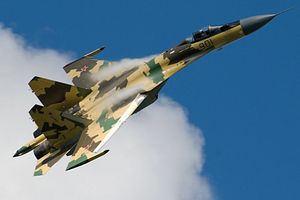China and Russia have finally signed a contract estimated to be worth $2 billion for the purchase of 24 Russian-made Sukhoi Su-35 multirole fighter jets, TASS reports, based on information obtained by the Komersant business daily.
“The protracted talks on Su-35 deliveries to China have ended. We have signed the contract,” Sergey Chemezov, director-general of the Russian state corporation Rostec, told Komersant.
“China has officially become the first foreign contractor of the Su-35 aircraft. The contract has no precedents in the history of military aircraft deliveries,” he added.
According to TASS, the 24 Su-35 fighter jets will be built at the Komsomolsk-on-Amur Aircraft Production Association in Russia’s Far East. A high-level official in the Khabarovsk Territory government told TASS:
Closed talks between representatives of China and Russia were held on Sunday in Komsomolsk-on-Amur. These negotiations were in progress for several years; the Chinese military was interested in Su-35 fighters and the possibility of putting them into service in China. The contract was concluded on purchasing 24 Su-35 fighters.
The purchasing price per aircraft is estimated at $83 to 85 million.
China had first expressed interest in the Sukhoi Su-35 during the China International & Aerospace Exhibition in 2008 with negotiations starting in 2011. A preliminary agreement over the purchase of the fighter jets was reached in 2012.
The Su-35 (NATO reporting name: Flanker-E) is a Fourth++ generation, twin-engine, highly maneuverable multirole fighter jet powered by two AL-117S turbofan engines. The Russian aircraft’s powerful turbofan engine is also the most likely reason why China is interested in acquiring Su-35 fighters.
As Jesse Sloman and Lauren Dickey noted in a piece for The Diplomat:
With its domestic programs seemingly in limbo, some analysts have argued that an AL-117S purchase would be the fastest way for the Chinese to get their hands on a suitable turbofan for the J-20. Since Russia is reportedly unwilling to sell the new engine as a standalone product, the PLAAF will have to buy the Su-35 and acquire the AL-117S as a part of a complete weapons system.
Beijing has had difficulties in designing and building a powerful enough jet engine for its new fifth-generation fighter prototypes, the Chengdu J-20 and Shenyang J-31. Both aircraft are flying with older Russian-made jet engines, the J-20 with the Saturn AL-31 and the J-31 with the Klimov RD-93.
There have also been reports that China has been working on developing an improved version of the Aviation Industry Corporation of China (Avic) WS-13 Taishan turbofan, a derivative of the Russian Klimov RD-33 turbofan, with mixed results (See: “China Displays 5th Generation Stealth Fighter”).
The most advanced Chinese-made military turbofan currently in use is the WS-10, which, however, also underperforms, according to some reports. Thus, the Su-35 order is a “win-win” for both the People’s Liberation Army Air Force (PLAAF) and China’s burgeoning military aircraft industry.
































